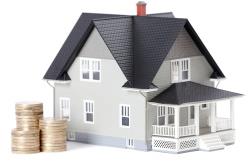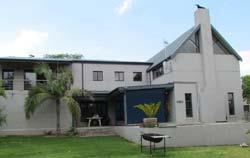Nominal year-on-year (y/y) growth in the average value of homes in the middle segment of the South African residential property market appears to have reached an upper turning point in March 2013.

A home is Summerhaze cluster development in River Club, Sandton Johannesburg is one of the four luxury homes sold by Ennik Estates at a combined cost close to R60 million recently.
According to the Absa House Price, this is in line with the expectation that base effects and slowing monthly price growth since mid-2012 would eventually bring about a moderation in y/y price growth.
Writing in the report, Jacques du Toit, Absa Home Loans property analyst, says the middle-segment nominal house price growth was 11.1 percent y/y in April from 11.3 percent y/y in March.
In March, the average nominal value of small homes (80 to 140 square metres) was R736 800, medium-sized homes (141-220 square metres) was R1 066 500 and large homes (221 to 400 square metres) was R1 615 400.
Du Toit points out that interest rates remained stable since the last cut in July 2012, mainly as a result of trends in and prospects for the economy, inflation and the household sector.
“Although Absa’s view is for interest rates to stay at current levels until mid-2014, financial market sentiment is mounting for a further rate cut later this month when the South African Reserve Bank’s Monetary Policy Committee meets.”
He says this expectation of another cut in interest rates comes against the background of subdued global growth and domestic economic developments.
“Continued low interest rates will support the property market and benefit the affordability of housing and mortgage finance.”
Based on the latest trends in house price growth and factors impacting the housing market, single-digit nominal y/y price growth is forecast for the full year.
Real house price growth will continue to be driven by a combination of movements in nominal prices and consumer price inflation, he notes.
Meanwhile, the Standard Bank House Price Index improved by 9.3 percent y/y in April from 8.6 percent y/y in March.

In March, the average nominal value of small homes (80 to 140 square metres) was R736 800, medium-sized homes (141-220 square metres) was R1 066 500 and large homes (221 to 400 square metres) was R1 615 400.
Sibusiso Gumbi, Standard Bank Home Loans property analyst says the nominal index growth for freehold properties recorded a 10.5 percent y/y improvement in April from 9.5 percent y/y in March, while the improvement in the nominal index of sectional title units remained at 6.1 percent y/y in April.
He notes that building contractors reported an increase of 5.8 percent y/y in input costs (including labour, materials, plant and fuel) in the year to January 2013.
This is roughly in line with CPI inflation, which averaged 5.7 percent y/y in Q1 2013, he says.
Gumbi says household indebtedness and impaired credit records remain key stumbling blocks to a notably improved uptake in mortgages.
Macroeconomic conditions do not suggest mortgage growth breaking double-digits in 2013, according to Gumbi.
Buying and selling in this market
While many homes may be sitting for longer in the market, four luxury homes in Gauteng were recently sold at record prices.
Ennik Estates, luxury homes marketer sold four homes at combined prices close to R60 million.
According to Ennik Estates founder and chief executive officer Ronald Ennik, the properties are located at Cornwall Hill Country Estate in Irene, Pretoria, Linksfield Ridge in Johannesburg (on the view site eastern tip of the ridge), Waterstone Estate in Benmore Gardens, Sandton and the Summerhaze cluster development in River Club, Sandton.
Ennik explains that the sale of the Summerhaze property was a particular milestone for consultant Denise Bruyns, a doyenne of Gauteng’s real estate community.
Bruyns originally helped bring to the Sandton market what were then (early 1980s) ‘new frontier’ suburbs like Duxberry, Morningside 40, and River Club – areas in which spec building was rife at the time, and buying homes off-plan was unexceptional.
She was also instrumental in the sale of Waterstone Estate property, says Ennik.

This four bedroom Sonstraal Heights home is on the market for R2.25 million through Rawson Properties.
Consultants Vicky and Julia Torrente (a mother and daughter team of view site home specialists) played a key role in the marketing of the Linksfield Ridge property – which stretches across three acres, with a circa World War Two home as its centrepiece.
They consulted on and facilitated the sale of many homes with a view in Linksfield Ridge – where Vicky negotiated her first transaction over 20 years ago.
In the Western Cape, Tony Clarke, managing director of the Rawson Property Group reports that there is currently strong demand in the lower home price category.
This is seen in almost all areas in the Cape’s affluent Constantia Valley, for example, it is the properties in the R2 million to R4 million bracket – cheap by Constantia standards – that are selling fast, while the market for the R5 million plus homes, although improving, is still a difficult one.
In Mitchell's Plain, homes priced between R600 000 to R850 000 sell fast whereas those priced above R1.2 million battle to find buyers.
In the Durbanville area, widely recognised as an upmarket precinct with above average prices, demand is seen in one of the least expensive of Durbanville’s suburbs, Sonstraal Heights.
According to agent Louis Schoeman, in Sonstraal Heights, the average price is R1.3 million ( inexpensive by Durbanville standards) and sectional title units are priced from as little as R700 000.
One of the main reasons for Sonstraal Heights’ popularity, apart from its low prices, is that of its 3 450 homes, 28 percent are sectional title and 70 percent of the freehold units are in secure estates where demand is extremely strong, says Schoeman.
Durbanville appeals to buyers from all over the Greater Cape Town area and it is seen by many of these as the right place, both to live and to retire to, and a high percentage of these people have already been successful in their professions or in business and have the capital to invest.
Southern Suburbs buyers are particularly attracted to Durbanville because they recognise that their rands go a great deal further than in Rondebosch, Newlands, Claremont or Kenilworth.
“Future prospects for Durbanville property will be enhanced – and stock shortages alleviated by the approval of two large former farming/game park areas for residential development.”
Schoeman says the area to the west, which borders on Aurora, will bring a wide variety of homes - single residential, group housing and a fair number of upmarket estates.
The other section now approved for development is on the northeast side of Durbanville next to Graanendal.
He says the total area set aside will eventually have 20 000 homes, 4 000 of which will be serviced for delivery in the initial phase.
He adds that they expect the Durbanville market to continue to perform well going forward. – Denise Mhlanga









